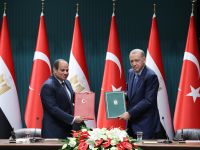Hunting down terrorists may prove tricky enough, but trying to arrest their clandestine sources of finance could prove just as elusive, bankers and finance analysts in London believe. Major world powers are increasingly dwelling on the financial dimension behind last week's terrorist strikes on the United States, arguing that a fight against terrorists means a fight against their channels of funding.
Already authorities in several countries are probing claims that those behind the kamikaze assaults on the World Trade Center and Pentagon may have used their financial muscle to 'play the markets' in the run-up to the attacks.
Britain meanwhile called Wednesday, September 19, for more resolute international action to staunch the lifeblood of funding that bankrolls terrorists. Finance chief Gordon Brown put the emphasis on "reporting", saying that all financial institutions should declare dubious transactions "so that there is not only no safe haven for terrorists but no hiding place for terrorist money."
Britain quickly moved to shut down a Barclays bank account believed to have links to terrorists, and urged robust action from international partners, particularly Switzerland, to ensure greater transparency in the global financial system.
"There are countries around the world that are not taking this kind of action and we must make sure the weakest links are dealt with as well," Brown said. "We want joint action to cut off the supply of funds to terrorists," he said. "They are being financed somewhere and get their money through bank accounts which we can stop."
But some sector insiders said it wasn't as easy as that. "It is going to be complicated," said Noel de Berry, a banking consultant who advises financial institutions. "People are allowed to have many bank accounts. Transactions take place in seconds. There's a lot more happening that can ever be tracked down," he told AFP. "Money can be moved across the world, make three or four jumps in a very short time and come back again."
The battle against money laundering is nothing new, and bankers point out that great efforts have been made in recent years to stop the practice. British bankers can even enroll in a course against money laundering.
Financial experts say banks will ignore any obvious bona fide corporate activity and will overlook transactions under a five-figure sum because that is not likely to be a feed for terrorism. But that still leaves a welter of complex transactions to wade through, and even if willing, banks will need to devote formidable man-hours to the task to succeed.
Only recently, British banks were recently reprimanded for lax controls in handling hundreds of millions of pounds allegedly looted by former Nigerian dictator Sani Abacha. "The problem is that everybody has a bank account," said a spokesman for Barclays Bank, Bruce Lee. "The fact that someone has a bank account doesn't mean that — even if that person is under suspicion — the bank account is anything odd."
Roger Alford, a finance expert at the London School of Economics, said the main task was tracing suspect transactions back with the help of banks. But even that posed a problem. "The trouble is of course that a lot of these people, Middle East millionaires who are maybe financing terrorist groups, they also do all sorts of perfectly legal transactions as well," Alford told AFP.
Others fear meanwhile that a crackdown could mean an inevitable curb on civil liberties —with dire consequences for the innocent well to do. "To what extent should you, or the government have the right to see somebody else's bank details or financial details?" asked Ben Coleman, a spokesman for the International Tax and Investment Organization, a grouping, which represents off-shore centers.
"The very few rich people in Afghanistan who try to hide their money from the Taliban or those in Iraq trying to get out of the country and trying to keep their money from the Iraqi government — they all need the protection that this sort of secrecy provides," he said. ― (AFP, London)
by Mark Rice-Oxley
© Agence France Presse 2001
© 2001 Mena Report (www.menareport.com)







